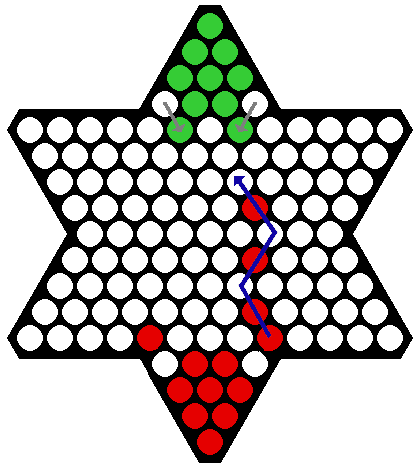Chinese Checkers Free Online
Halma

Chinese Checkers online, free 6
Chinese Checkers is an exciting free to play board game for young and adults, Play this amazing game Chinese Checkers online for free at Fundecade.com. Chinese checkers is a board game that can be played by two to six people. The object of the main game is to place one's pieces in the corner opposite their starting position by moving them through jumps over other pieces. The game does not actually originate from China (nor is it a variation on checkers or Chinese chess), but was given that. Library: Chinese Checkers Play Free Online - EPUB, PDF.
Games A-lot Chinese Checkers Free Online Games
Most people consider that Halma is a Victorian British game and perhaps it was the Victorians who took to the game and made it popular. However, the Games historian Bruce Whitehill in the early 2000s undertook a quest to prove that Halma was American and indeed he found plenty of evidence to this end.

Bruce's article on the subject says 'HALMA was invented between 1883 and 1884 by George Howard Monks, an American thoracic surgeon at Harvard Medical School. Robert Monks, brother of G.H. Monks, discovered the British game of HOPPITY during a trip to England in 1883 or 1884. He described the game to his brother George, who then took a couple of suggestions from HOPPITY and created HALMA, but not in such a way as to infringe on HOPPITY's copyright.'
It seems that a mathematician and preacher called Thomas Hill, who later became president of Harvard, was also involved in the development of the game and it was he who came up with the name 'Halma' which is Greek for 'jump' (a story reminiscent of the game, Jenga, which means 'build' in Swahili, invented a century later). George Monks filed Patent number: 383653 on Dec 14, 1887 and it was issued in May 1888.
E.I.Horsman (see below) first published Halma but the rights to it were challenged in the courts by Milton Bradley. MB lost the war and ended up publishing a slight variant under the name 'Eckha'.
In England, F.H. Ayres included some rules in a handbook copyrighted in 1889, which is the earliest British record yet found by this author, and it was also published by Jaques, Spears and probably other manufacturers around this time.

The objective of Halma is to move all your pieces from your corner into the opposing corner. Each turn, a piece is moved to the adjacent square or, if possible, a piece can be moved by hopping over an adjacent piece into the hole the other side from where it can hop over another adjacent piece if such exists and so on. The game starts to get interesting when there are lots of pieces in the centre as a turn then will usually consist of a single piece making multiple hops over several pieces and moving some distance.
To the left is shown a box for holding Halma pieces owned by the author's parents'.
Next, a commercial board from the 1930s, 1940s. Picture by kind permission Kidd's Toys.
Below, a wooden Halma game owned by the author set up as for the start of the game. The origin of this board is unknown - anyone have any ideas?
Below right - the earliest American board that the author has come across was a simple cardboard version without the pieces. A sticker on the board read 'Halma Pat. May 29 1888. Published by E.I. Horsman, New York. Copyrighted 1885'. Bruce Whitehill believes that this was the earliest publication of the game.